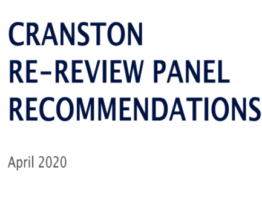
Promontory and Mazars, the “skilled persons” appointed by the FCA to investigate the activities of RBS’s Global Restructuring Group (“GRG”), have completed their draft report into whether RBS mistreated small and medium-sized companies (“SMEs”).
The FCA said initially that it would publish the results in late 2014, but it has moved the deadline several times, citing the complex and serious nature of the allegations. Its latest update confirms that it has now received the draft final report from the skilled persons and is currently “considering the contents of the report” and “reviewing underlying evidence”. It will also give RBS the opportunity to review the report before publication.
What is the GRG?
The GRG was a notorious unit within RBS where businesses were sent if they were in financial distress.
The stated aim of the GRG was to put companies into intensive care to turn them around, and to restructure their debts if necessary.
However, it has instead been accused of driving RBS’ SME customers into insolvency so that, amongst other things, it could make a profit on buying their assets, through its West Register subsidiary.
A report into the practices of the GRG, by Lawrence Tomlinson, the Entrepreneur in residence at the Department for Business, Innovation and Skills at the time, was released on 25 November 2013. This found numerous examples of the GRG artificially distressing otherwise viable businesses and driving them into insolvency and concluded that these practices were systematic and institutional.
In response, RBS retained Clifford Chance to investigate the Tomlinson Report’s findings. Clifford Chance found no evidence that the Tomlinson claims were true.
Since then, RBS executives have appeared before the Treasury Select Committee to answer claims about the GRG. The TSC found that some of the evidence given by two particular RBS’ employees was “materially incorrect” and “unacceptable”.
The FCA Review
According to the FCA’s website, its report will: “examine RBS’ treatment of business customers in financial difficulty and consider the allegations of poor practice on the part of the GRG, set out in the report by Dr Lawrence Tomlinson and referenced in Sir Andrew Large’s report [both released in November 2013]”.
“The first stage of the review will consider RBS’ treatment of a sample of customers referred to its Global Restructuring Group. This will include some cases where customers have already raised concerns with Dr Tomlinson, the Department of Business, Innovation and Skills or the FCA.
The review will also consider whether any poor practices identified are widespread and systematic. If this is the case, the second stage of the review will identify the root cause of these issues and make recommendations to address any shortcomings identified.…. if the findings reveal issues which come within the FCA’s remit, the FCA will consider further regulatory measures.”
The FCA’s findings are eagerly anticipated, as RBS could now face a voluntary or enforced redress scheme if the FCA decides that RBS has breached FCA principles.
This prospect seems ever more likely as The Times reported on 2 May 2016 that RBS has now put the manager responsible for its interest rate hedging products redress scheme in charge of a programme to look at victims of its global restructuring division.
The Times reported that Mark Spurin is now leading an RBS internal team in preparation for the findings of the FCA Report, which strongly suggests that some form of redress scheme will be forthcoming.
DS Law has advised a number of clients in connection with claims arising out of their treatment at the hands of the GRG. We also have expertise in acting for clients in FCA compensation schemes, based on our experience in acting for clients in the FCA’s review into interest rate hedging misselling.
This case is one of the largest and most disturbing British banking scandals in living memory. The level and nature of the fraudulent activity to emerge from the criminal trial and the length of time for which the fraud continued is quite breath-taking and the lives of countless individuals and their businesses have been destroyed.
This article is for information purposes only and is not legal advice. No reliance may be placed upon it and the firm accepts no responsibility for the accuracy of its content.







Write a comment:
You must be logged in to post a comment.